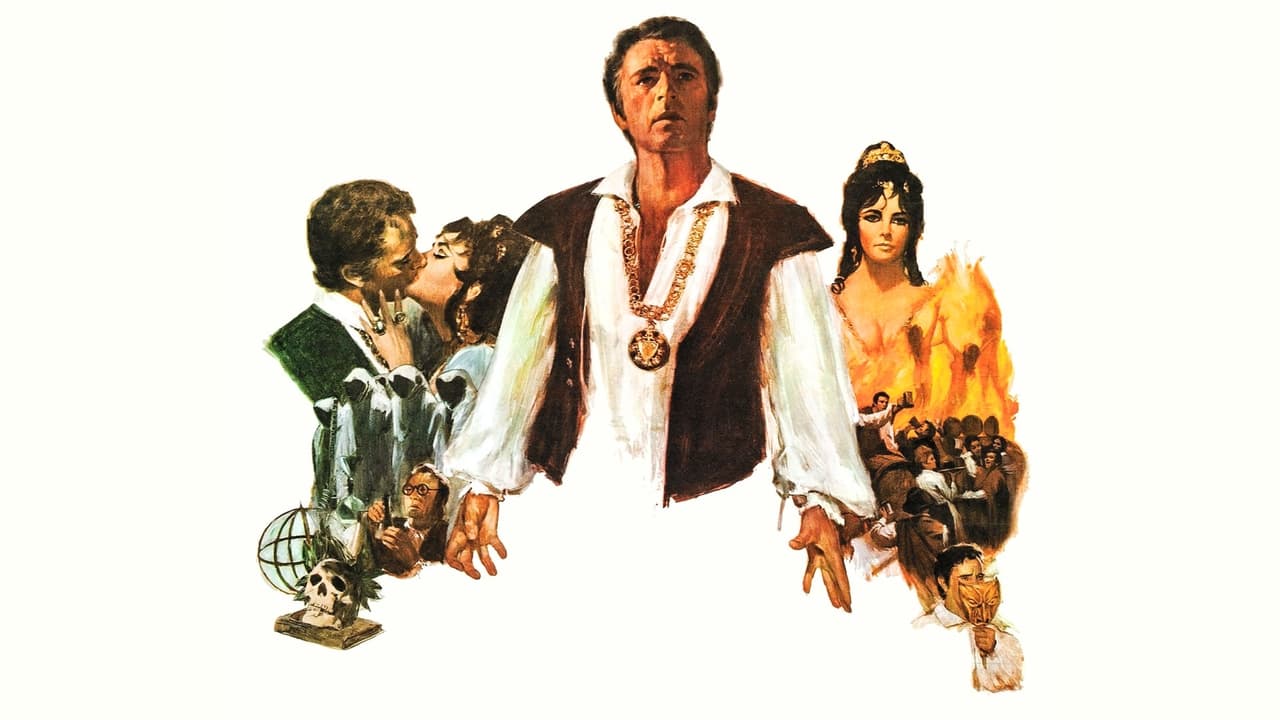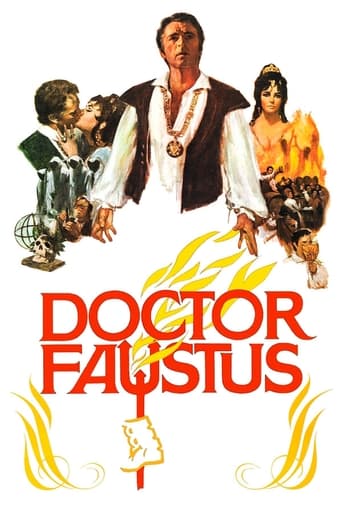

Some things I liked some I did not.
... View MoreThe film may be flawed, but its message is not.
... View MoreI enjoyed watching this film and would recommend other to give it a try , (as I am) but this movie, although enjoyable to watch due to the better than average acting fails to add anything new to its storyline that is all too familiar to these types of movies.
... View MoreThere are moments that feel comical, some horrific, and some downright inspiring but the tonal shifts hardly matter as the end results come to a film that's perfect for this time.
... View MoreA literary horror film--that sounds like an absurd concept, but Richard Burton, Elizabeth Taylor, and the Leonard Nimoy-like Andreas Teuber bring it off. The most striking aspect of Dr. Faustus are the surprisingly good special effects. The atmosphere, music, and colors combine in an hallucinogenic mix. Yes, it's stagey, as expected, but it flows well nonetheless; the erudite dialogue enhancing the forlorn creepiness.I agree with those who mention that Taylor's make-up is overdone in some scenes. She hardly needs artificial means to look sexy and alluring. It's remarkable that her character loses nothing despite having no dialogue; a good counterpoint to Faustus and Mephistopheles's learned verbal jousting. I even appreciate the copious amounts of Latin; I could scope out some of it, and, in general, it added to the Medieval luster.There's a lot going on here, both visually and intellectually. As others have noted, Teuber's description of hell is a sort of existentialist view of the human condition; Burton's desire to sell his soul has an escapist undertone, like a person on drugs. Like an addict, Burton/Faustus can't get enough hedonistic pleasures. But he has to ultimately 'come down,' literally down to hell. The ending is perhaps the best scene: hell swallows Faustus up a in a claustrophobic dungeon. Sensual pleasures become scenes of torture and madness. In another macabre scene, this time near the beginning, Burton comes upon a sort of desecrated altar in a hideous forest--the definition of haunted. At the other extreme, watching he and Teuber floating in space among the stars is beautiful, majestic. The rotting corpses are very effective, especially as they shift from dismal images of death to the horrid, all too real depictions of decay.The movie is entertaining enough with the relentless parade of horror; there's also the horrible inner tension, as Faustus continues to doubt his switch of allegiance from God to the Devil. One sort of hopes that he will come back to God. He nearly does. It's interesting that God will forgive him, and take him back; but the devil won't give him up without retribution.It's good that the generally obnoxious scene at the Papal court ultimately turns dark; this comic interlude disrupts the tone, as though being in league with the devil is a harmless prank. Faustus's trickster ability is much better handled when he exposes the Emperor's knight as a cuckhold. I must admit I haven't read the original play; I read Goethe's Faust many years ago for a class, but I'm not that familiar with the Faust myth/story. Anyway, a thoroughly enjoyable film for fans of classic horror, and even for those into classic literature. Where else can you hear that fine medievalism from no less a luminary than the Holy Roman Emperor, when he speaks of Faustus's powers as "cunning arts"?
... View MoreRICHARD BURTON gets to tear the scenery to pieces as DOCTOR FAUSTUS, directing himself into a frenzy of stylized theatrical acting as though he didn't know the camera would magnify his every over-sized movement.Fortunately, ELIZABETH TAYLOR is only allowed to parade her beauteous face before the close-up cameras without uttering a word. Only toward the end does she have to shriek like a mad woman as Faustus loses his soul to hell.But Burton's histrionics are on display and I doubt whether Charles Laughton or Peter Ustinov ever indulged in such extravagant overacting. His performance is a spectacle in itself.And unfortunately, the other cast members are almost mute by comparison, none of them exhibiting anything more than amateurish acting.The sometimes imaginative staging is pretty to look at, but none of it manages to stir up more than a modicum of interest. It's all done up in garish Technicolor with sets that look as though the low budget was put to efficient use.Summing up: In my humble opinion, a weird sort of bomb, totally lacking any sort of entertainment value.
... View MoreCerebral and altogether too-literal transcript of Christopher Marlowe’s venerable play – the end result is opulent yet claustrophobic, not to mention dull.Burton the producer/director certainly made inspired choices for his collaborators – production designer John De Cuir, cinematographer Gabor Pogany, composer Mario Nascimbene. Burton the actor, then, is riveting as always (particularly the monologue towards the end) – but real-life spouse Elizabeth Taylor is simply ludicrous as Faustus’ object of desire (in various disguises including Helen of Troy)! The remaining cast is largely made up of Oxford University drama students (the University itself, of which Burton was a former graduate, partly financed the film!): of these, only Andreas Teuber’s bald-headed, monk-clad Mephistopheles manages a striking performance.The “Mondo Digital” review had likened this to the cult horror films made by Hammer, Roger Corman and Mario Bava: judging by the campy Papal sequence (with a host of fey clergymen on whom Faustus plays childish pranks) and an equally tacky conjuring act before a medieval court, I’d say that Burton and Coghill probably drew more on the decadent work of Federico Fellini or Pier Paolo Pasolini than anything else! Anyway, the experimental nature of the film extends to the baffling over-use of a pointless ‘foggy’ effect; its depiction of lust, however, emerges as traditionally naïve – with frolicking satyrs in a garden setting and decorous female nudity (including Taylor herself for one very brief moment).Ulimately, DOCTOR FAUSTUS is to be considered an interesting failure – a personal tour-de-force for Burton but which, perhaps, needed a steadier hand…say, Joseph Losey (with whom the two stars would soon work on BOOM! [1968], curiously enough, a similar and equally maligned blend of fantasy and theatricality).
... View MoreI'll admit from the beginning that Marlowe's Tragical History of Doctor Faustus is one of my alltime favorite plays, and that I used to have it virtually memorized. The play is itself so good that any relatively true adaptation to the screen would make a thoughtful and enjoyable film.I am old enough to remember the tabloid brouhaha about Burton and Taylor, but even that unpleasantness is insufficient to intrude upon my complete enjoyment of this film. The dialogue is over 400 years old, requiring careful listening by the viewer who is unfamiliar with the play, but that viewer will be well rewarded for his attention. The dialogue is so rich with meaning, with philosophical nuance, with the heights and depths of human emotion that the attentive viewer cannot help but think about the meaning of his actions and the consequences of them, as well. This Doctor Faustus is a fleshed out (and fleshly) genius not unlike some of those we might encounter today. The scene in which Faustus knows for certain that all that, for which he has sold his soul, is illusion; yet he still cannot bring himself to renounce it all, and redeem himself, strikes at the souls of all of us. As Don Blanding wrote about his imagined painting entitled "Sin!" I love while I loathe the beastly thing. I guess that's the way one feels about sin."
... View More